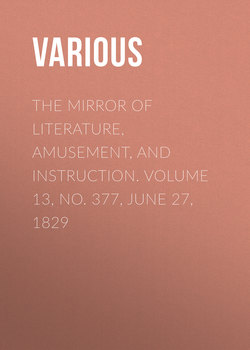Читать книгу The Mirror of Literature, Amusement, and Instruction. Volume 13, No. 377, June 27, 1829 - Various - Страница 3
Loch Goil Head
CURIOUS EXTRACTS FROM CURIOUS AUTHORS, FOR CURIOUS READERS
Оглавление(For the Mirror.)
Hollingshed, who was contemporary with Queen Elizabeth, informs us, "there were very few chimneys (in England in his time) even in the capital towns; the fire was laid to the wall, and the smoke issued out at the roof, or door, or window. The houses were wattled, and plastered over with clay, and all the furniture and utensils were of wood. The people slept on straw pallets, with a log of wood for a pillow."
Cambrensis, Bishop of St. David's, says, "It was the common vice of the English, from their first settlement in Britain, to expose their children and relations to sale;" and it also appears, "that the wife of Earl Godwin, who was sister to Canute, the Danish King of England, made great gain by the trade she made of buying up English youths and maids to sell to Denmark."
Lord Bacon in his Apophthegms, says, "Ethelwold, Bishop of Winchester, in a famine, sold all the rich vessels and ornaments of the church, to relieve the poor with bread; and said, 'There was no reason that the dead temples of God should be sumptuously furnished, and the living temples suffer penury.'" Ingulphus tells us, "For want of parchment to draw the deeds upon, great estates were frequently conveyed from one family to another, only by the ceremony of a turf and a stone, delivered before witnesses, and without any written agreement." Andrews, in his History of Great Britain, says, "In France, A.D. 1147, the great vassals emulated and even surpassed the sovereign in pomp and cost of living." As an instance of the wild liberality of the age, we are informed, that Henry the "munificent" Count of Champagne, being applied to by a poor gentleman for a portion to enable him to marry his two daughters: his steward remonstrated to him, "that he had given away every thing," "thou liest," said Henry, "I have thee left;" so he delivered over the steward to the petitioner, who put him into confinement until he gave him 500 livres, a handsome sum in those days.
Bede tells us, "Archbishop Theodore, when (in the seventh century) he gave lectures on medicine at Canterbury, remonstrated against bleeding on the 4th day of the moon, since at that period (he said) the light of the planet and the tides of the ocean were on the increase." Yet Theodore was, for his era, deeply learned.
William of Malmsbury says, "Very highly finished works in gold and silver, were the produce even of our darkest ages. The monks were the best artists. A jewel, now in the museum at Oxford, undoubtedly made by command of, and worn by Alfred the Great, is an existing witness of the height to which the art was carried. Curious reliquaries, finely wrought and set with precious stones, were usually styled throughout Europe, Opera Anglica."
Howel tells us, "In the education of their children, the Anglo-Saxons only sought to render them dauntless and apt for the two most important occupations of their future lives—war and the chase. It was a usual trial of a child's courage, to place him on the sloping roof of a building, and if, without screaming or terror, he held fast, he was styled a stout-herce, or brave boy."
Fitz-Stephen says, "Thomas à Becket lived in such splendour, that besides having silver bits to his horses, he had such numerous guests at his banquets, that he was obliged to have rooms covered with clean hay or straw, in winter, and green boughs or rushes in summer, every day, lest his guests, not finding seats at his tables, should soil their gay clothes by sitting on the floor." He would pay five pounds (equal nearly to fifty pounds of our money) for a single dish of eels. Once riding through London with Henry, the King seeing a wretched, shivering beggar, "It would be a good deed (said he) to give that poor wretch a coat." "True, (said Becket.) and you, sir, may let him have yours." "He shall have yours" said Henry, and after a heavy scuffle, in which they had nearly dismounted each other, Becket proved the weakest, and his coat was allotted to the astonished mendicant.
"When William the Conqueror was crowned at Westminster, the people (says Andrews) within the Abbey shouted, on the crown being placed on his head, the Normans without, thought the noise a signal of revolt, and began to set fire to houses, and massacre the populace, nor were they satisfied that all was well until considerable mischief had been done."
"Dr. Henry, (says Sulivan) who has made a very full collection of the facts mentioned by ancient authors, concerning the provincial government of Britain, supposes its annual revenue amounted to no less than two millions sterling; a sum nearly as great as that which was derived from Egypt, in the time of the father of Cleopatra. But this calculation is built upon the authority of Lipsius. Nor are there perhaps any accounts transmitted by historians, from which the point can be accurately determined. The Britons excelled in agriculture. They exported great quantities of corn, for supplying the armies in other parts of the empire. They had linen and woollen manufactures; as their mines of lead and tin were inexhaustible. And further we know, that Britain, in consequence of her supposed resources, was sometimes reduced to such distress, by the demands of government, as to be obliged to borrow money at an exorbitant interest. In this trade, the best citizens of Rome were not ashamed to engage; and, though prohibited by law, Seneca, whose philosophy, it seems, was not incompatible with the love of money, lent the Britons at one time above three hundred and twenty thousand pounds."
P.T.W
